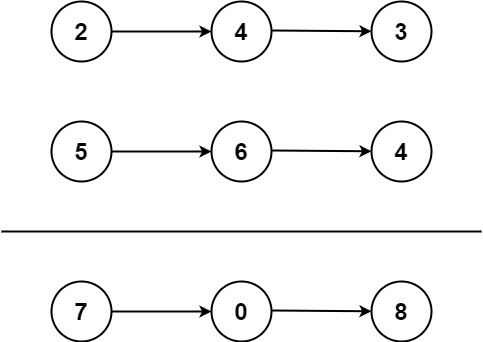You are given two non-empty linked lists representing two non-negative integers. The digits are stored in reverse order, and each of their nodes contains a single digit. Add the two numbers and return the sum as a linked list.
You may assume the two numbers do not contain any leading zero, except the number 0 itself.
Example 1:
Input: l1 = [2,4,3], l2 = [5,6,4] Output: [7,0,8] Explanation: 342 + 465 = 807.
Example 2:
Input: l1 = [0], l2 = [0] Output: [0]
Example 3:
Input: l1 = [9,9,9,9,9,9,9], l2 = [9,9,9,9] Output: [8,9,9,9,0,0,0,1]
Constraints:
- The number of nodes in each linked list is in the range
[1, 100]. 0 <= Node.val <= 9- It is guaranteed that the list represents a number that does not have leading zeros.
Companies:
Amazon, Microsoft, Facebook, Bloomberg, Adobe, Apple, Google, Yahoo, Uber, Capital One, JPMorgan, Huawei
Related Topics:
Linked List, Math, Recursion
Similar Questions:
- Multiply Strings (Medium)
- Add Binary (Easy)
- Sum of Two Integers (Medium)
- Add Strings (Easy)
- Add Two Numbers II (Medium)
- Add to Array-Form of Integer (Easy)
- Add Two Polynomials Represented as Linked Lists (Medium)
// OJ: https://leetcode.com/problems/add-two-numbers/
// Author: github.com/lzl124631x
// Time: O(N)
// Space: O(1)
class Solution {
public:
ListNode* addTwoNumbers(ListNode* a, ListNode* b) {
int carry = 0;
ListNode dummy, *tail = &dummy;
while (a || b || carry) {
if (a) {
carry += a->val;
a = a->next;
}
if (b) {
carry += b->val;
b = b->next;
}
tail->next = new ListNode(carry % 10);
tail = tail->next;
carry /= 10;
}
return dummy.next;
}
};